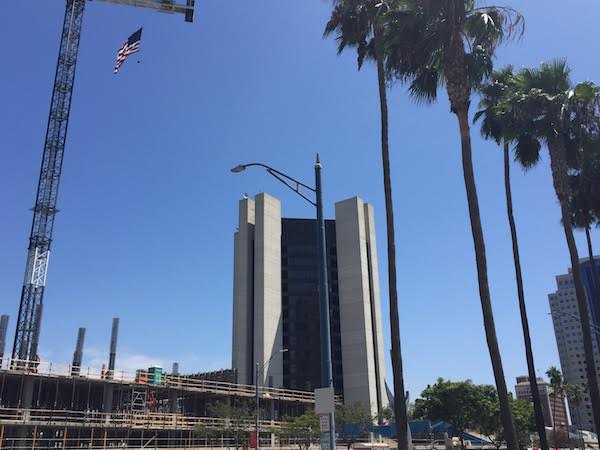
Some light poles in the downtown area will soon double as transmitters for Verizon. Photo: Jason Ruiz.
New light poles are coming to the downtown sector but they won’t just be pumping out lumens when the sun goes down. The Long Beach City Council voted unanimously Tuesday night to enter into an agreement with Crown Castle LLC to install 21 new light poles that will double as micro-cell stations for telecommunications.
Crown Castle, in this deal, is representing Verizon Wireless, which according to city documents, sought the installation of the micro-cell stations to expand its coverage capabilities in the area during high-volume events like the annual LGBT Pride and the Grand Prix of Long Beach.
The microcells will be incorporated into the new light poles which will be installed by Crown Castle in an attempt to fill in the gaps of Verizon’s current network, one that it claims has incurred numerous customer complaints over dropped calls during these large-scale events.
A majority of the installations will run along Shoreline Drive between Alamitos and Chestnut Avenue with a handful also being installed along Ocean Boulevard between the same streets. The furthest north installation will be on Pine Avenue just north of Broadway.
The new poles will be paid for by Crown Castle which will also pay an annual lease payment to the city at a rate of $1,500 per pole. They’re expected to closely resemble the existing poles that are in place with the new ones having a slightly larger diameter.
The deal is expected to generate about $31,500 annually for the city’s public works department which the department plans to use for future pole replacements, however, Long Beach Public Works Director Craig Beck said that the funds could be used for other department needs.

A map of the proposed sites for the small-cell installations.
Other cities have entered into similar contracts with telecommunication companies and have charged more than double the amount that Long Beach will lease the light poles to Crown Castle for but Beck said that the $1,500 amount was deemed an “appropriate” annual amount by city staff.
The deal comes at a time when a bill currently working its way through the state legislature could significantly expand telecommunication companies’ abilities to expand their service networks using public right of ways—street lights, power poles, street lights—by cutting through local red tape.
Senate Bill 649 has been the subject of multiple editorials by some of the state’s largest newspapers for its potential to severely undercut local municipalities’ abilities to negotiate agreements like the one Long Beach entered into last night.
While the transponders could help companies like Verizon and AT&T roll out the next phase of wireless data services (5G), opponents also argue that it would strip cities of its bargaining power to push providers to offer services to underserved communities if access to public right of ways is more or less guaranteed to telecom companies.
“The City’s primary concern with some elements of SB 649 relates to the ability for local review and oversight,” Beck said in an email. “Some companies have shown little concern for the impacts that small cell can have on adding to the visual blight in a community. The Crown Castle proposal is a responsible way to move forward where new poles are being provided that will hide the majority of small cell components from the public’s view.”
Beck’s last point was a nod to the light poles themselves which are being replaced with wider poles that are meant to house many of the new components needed to operate the network bridges. Other installations could be as big as a small refrigerator in some cases, and if SB 649 passes, city governments could have little recourse to stop those small-cell components from being installed on other public right of ways.
The city is currently reviewing other applications for future small-cell installations and the ones approved Tuesday night could be subject to having the small-cell equipment removed in the event that Crown Castle terminates the lease and cannot find another vendor to use the technology. The poles, though, would remain in place.
SB 649 is currently working its way through the California State Assembly.

